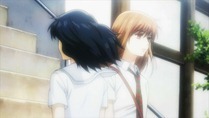 |
 |
 |
After a long build-up, the circle – or at least the triangle – is finally in place as Arata rejoins the narrative. This time, it looks as if he’s here to stay.
There was certainly plenty of high drama in this week’s episode, though even with Bishie #2’s return there still isn’t much overt romance. Chihaya seems to be the last person in the world to realize that the most compelling love triangle since <em>True Tears</em> exists here – Taichi and Arata certainly know it. The rest of the team members seem to have sussed it out, and the audience is clearly in on the secret. But for Chihaya, there simply isn’t room in her still immature consciousness for an overt acknowledgement of romantic feelings, whatever they might be. And the complicated non-romantic feelings that exist between the main trio (and the other Mizusawa team members) are plenty powerful enough to drive the story forward.
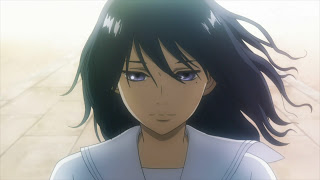 It’s an axiom of sports shounen (which is a big part of this series’ genetic code) that the team can’t go all the way on their first try, so it was no surprise that Mizusawa fell short in their first trip to Nationals. I was a little surprised it all went down as fast as it did, though, with Chihaya falling ill in the first match and the rest of the team not even getting any camera time as they won two matches but bowed out of the tournament. I would have loved to have seen Tsutomu’s first or even second win on camera, for example, but it didn’t happen that way. That certainly represents a triumph for him, establishing him as a contributing member of the team even as they tried to use him as a sacrificial pawn. I’d love to know more details of how the matches played out – who won, who lost, and how – but I doubt we’ll get that. Whatever on-screen drama we get from the tournament will have to come from the individual event, which Arata apparently isn’t entered in.
It’s an axiom of sports shounen (which is a big part of this series’ genetic code) that the team can’t go all the way on their first try, so it was no surprise that Mizusawa fell short in their first trip to Nationals. I was a little surprised it all went down as fast as it did, though, with Chihaya falling ill in the first match and the rest of the team not even getting any camera time as they won two matches but bowed out of the tournament. I would have loved to have seen Tsutomu’s first or even second win on camera, for example, but it didn’t happen that way. That certainly represents a triumph for him, establishing him as a contributing member of the team even as they tried to use him as a sacrificial pawn. I’d love to know more details of how the matches played out – who won, who lost, and how – but I doubt we’ll get that. Whatever on-screen drama we get from the tournament will have to come from the individual event, which Arata apparently isn’t entered in.
The team tournament pretty much confirmed what’s been Chihaya’s obvious weakness as a player. She’s simply too much a victim of her own emotions, getting too high and falling too low. When she loses it’s invariably her own doing, and this was another example, as she became so overexcited and anxious that she literally made herself ill. It fits right in with her open, excitable and erratic temperament – as pointed out by the Empress’ observation that “She looks like a beautiful girl because she’s not talking or moving around!” Pretty much Chihaya’s only states of being seem to be either on fire or unconscious, and that’s both her strength and her vulnerability as a Karuta player. With time – and timely coaching from Harada-sensei (and Arata?) she’ll need to grow through that.
As for Arata, we finally closed the loop on his exit and eventual re-embrace of Karuta, and it was every bit as heartbreaking a story as you’d expect. We knew some of the details already, but the fact that it was his Grandfather (Arimoto Kinryuu) that encouraged him to leave him alone and go to the Fukui tournament just makes it that much much poignant and painful. I thought the scenes between the two – and the portrayal of Grandpa’s gradual decline – were really well done. But in the end, whatever guilt he feels, Arata had to realize that his Grandfather would have wanted him to keep playing, and – as his old teacher pointed out – Master <strike>Sai’s</strike> Wataya’s <strike>Go</strike> Karuta best lives on in <strike>Hikaru</strike> Arata, and there could be no better expression of love than to keep playing the game they both love. And it doesn’t hurt that Chihya and even Taichi, who seem like the closest friends he’s ever had, are still a part of that world.
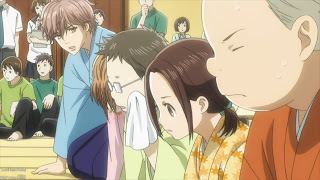 There should be some fireworks in the individual tournament. I assume Nishida will play, but I wonder if Taichi will. We know “Sadist” Sudo is there, as well as The Queen, who made her appearance in a comically epic crossing of paths with Chihaya on the Shrine steps. All of the major characters are going to be tested here, even if not on the tatami – certainly Taichi will, as he watches Chihaya and Arata interact for the first time in four years. The expression on his face as he saw Arata for the first time, then realized he could entrust the unconscious Chihaya to him says a lot about his growth as a person – though that should have been obvious enough already. I suspect he’ll handle himself well, though it won’t be easy for him.
There should be some fireworks in the individual tournament. I assume Nishida will play, but I wonder if Taichi will. We know “Sadist” Sudo is there, as well as The Queen, who made her appearance in a comically epic crossing of paths with Chihaya on the Shrine steps. All of the major characters are going to be tested here, even if not on the tatami – certainly Taichi will, as he watches Chihaya and Arata interact for the first time in four years. The expression on his face as he saw Arata for the first time, then realized he could entrust the unconscious Chihaya to him says a lot about his growth as a person – though that should have been obvious enough already. I suspect he’ll handle himself well, though it won’t be easy for him.
 |
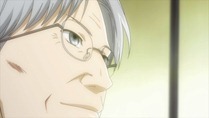 |
 |
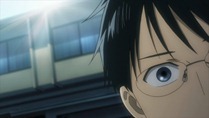 |
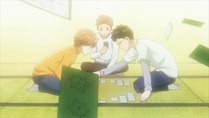 |
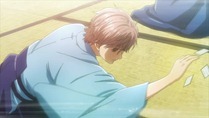 |
 |
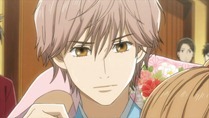 |
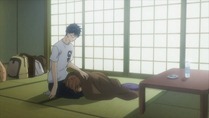 |
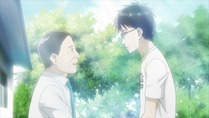 |
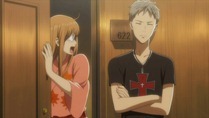 |
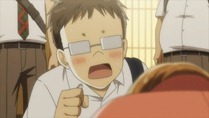 |
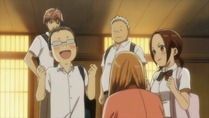 |
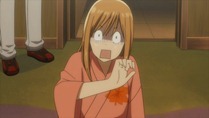 |
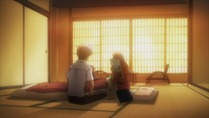 |


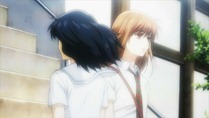
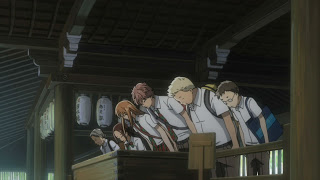
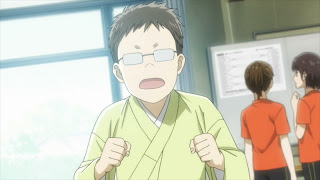
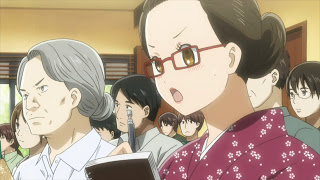


Helen
January 5, 2012 at 12:42 amThe link for "realized" took me straight to the blogger dashboard, might want to double check that. Other than that, I agree that moment really did highlight Taichi's growth. He probably would have handed her off to the Empress/Oe's mom otherwise but he actually seemed relieved that Arata was there and could help take care of this.
admin
January 5, 2012 at 1:10 amLOL, weird Blogger glitch #210098, thanks Helen.
Karmafan
January 5, 2012 at 5:24 amI really disliked how this episode played out. The big push to get there and represent Tokyo and its snuffed out just like that because she passed out. That leaves a seriously bad taste in my mouth.
Anonymous
January 6, 2012 at 3:07 pm*sorry for commenting here, but for some reason I can't semm to be enabled to comment under your Best of Best 2011 post ;_;. The profiles option submenu is not working for me there *
You really liked Ikoku Meiro XD. It's indeed a charming, tender and moving series and the more even/consistent overall among the ones I watched this year. It's not my top favourite but it's probably the one series ranking just around or just below the top 3 in basically each cathegory of my personal bests :). In terms of sheer enjoyment, ensemble cast and male protagonist my top pick is
Tiger & Bunny (what a surprise) ,
in terms of artistry bits, edge-of-my seat-zomg and OST my 1st place is for PMMM ,
for setting and ED is Un-Go,
and in terms of slice of 'mellow' and melancholic mood my vote belongs to Natsume San.
I still have to watch half of Steins;Gate, I wonder if it'll manage to snatch 1st place somewhere in my list XD.
Anohana is a popular favourite but it did very little for me outside of a growing irritation towards Menma. As she happened to be the story 'engine' this quite affected my (non) enjoyment of the show ^__^"" . I also suspect Mari Okada's writing per se is just not up my alley, ahah.
Thank you very much for the Dantalian OP mention, I would have totally missed the song otherwise. It's a good tune, just my taste down to the gibberish-y language XD.
Happy New Year, Enzo :>
Eli
admin
January 6, 2012 at 5:30 pmI believe that "gibberish" is Latin…
😉
Anonymous
January 6, 2012 at 7:17 pmUhmm… as a former Humanities Italian uni graduate XD, unless I've stumbled on a botched lyrics transcript (the lyrics were under the video you linked btw) or my hears deceive me the only Latin sentence making sense in Latin is the title ( the subject is omitted but I'd be tempted to translate the title as 'tomorrow never knows' XD). The lyrics themselves feature some random Latin words but every other romanesque-flavoured (aka Latin-derived. Nascour, vern et similia) word is either made up or picked from very old spelling – nascour and vern reminds me of early French poetry but I'm not sure at all they're actual words – or a mix of both , hence the sentences are… sort of random, ditto on their meaning/translation. Reminds me of Yoko Kanno's made up language songs, her own esperanto 😉
Eli
admin
January 6, 2012 at 8:37 pmLatin gibberish, in other words?
Anonymous
January 7, 2012 at 10:04 amYes and no. Nor grammar nor syntax nor the words themselves are true Latin outside of a handful of them, the title being the most prominent and only example of true Latin. Not sure if this is enough to label this concoction 'Latin' rather than 'Romanic' gibberish XD.
For instance: 'Siesta' is Spanish :p , Nova Sol is a Latin and literary (medieval) Italian and/or Spanish/portuguese mix, gender included: NovA is
a) a Latin adjective, here the suffix is either a feminine singular or a neuter plural one, meaning 'new'
b) feminine singular adjective in early and/or literary Italian, cfr. Dante's Vita Nova [New/Renewed Life] . Can't be Spanish or present day Italian as they would use nuevA and nuovA respectively in case of feminine singular nouns, nuevO and nuovO for masculine singular nouns.
Sol – aka Sun – is not a feminine noun in any of the aforementioned languages – Spanish included as I think you know 🙂 – .
In my mother tongue – Italian- the 'Sol' spelling is still used in poetry or lyrics, but the current everyday spelling is Sole. Portugues and Spanish on the other hand kept the Latin spelling as their standard one
http://en.wiktionary.org/wiki/sol#Latin ).
I think you get the picture 😉 *ends rambling*
Eli academic smartypants at your service ;p